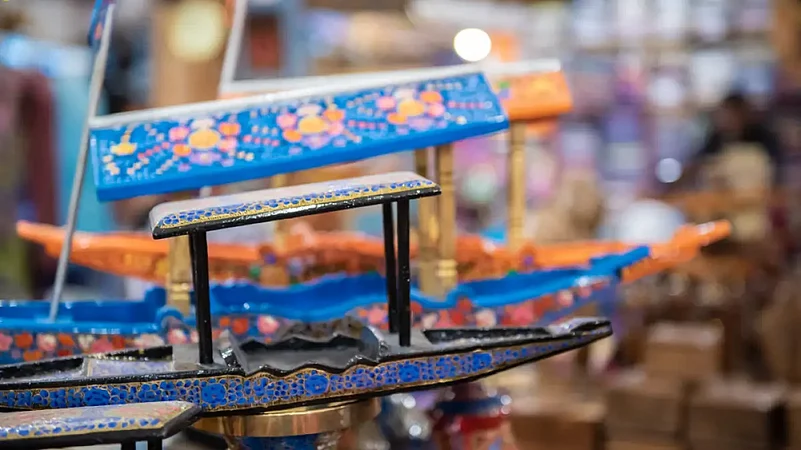In the age of machine-led industries, the handicrafts of Kashmir attract travelers, both local and international, for their skilled nature-inspired works. Let’s take a look at seven traditional handicrafts, some dying and others revived, that are still competing in the globalised twenty-first century market.
Papier Mache
The name was given by French traders in the fifteenth century to the art of paper pulp craft with delicate designs. This internationally recognised craft was brought to Kashmir by Sultan Zaid-ul-Adadin in the 15th century from Central Asia. Shah Hamdan mosque is the first mosque/place where its walls and ceilings were decorated using papier mache art. There are various kinds of papier mache products available in Kashmir now, from jewellery boxes to teapots, willow baskets, and exquisite elephants with gold-leaf and willow work.
Kani Sozni
When a kani woven shawl is embroidered using sozni embroidery technique, the final product is known as kani sozni. Intricate needlework of nature motifs such as lotus flowers, almond blossoms and chinar leaves are sewn at close distance to give the shawl an embossed look. The family of Shabir Ali Beigh in Srinagar is famous for producing fine embroideries where contemporary as well as traditional pattern designs are made. The kani sozni works with monochrome palettes and delicate designs are costlier.
Carpets And Rugs

Kashmiri silk and woollen carpets are considered to be among the finest in the world, they are exported to countries in North America and Europe. The carpets are handmade, hand-knotted, and intricately designed. In this photo, a traditional Kashmiri artisan is weaving a rug. Nowadays, younger generation artists have added new designs like calligraphy to traditional rugs to add more layers of meaning and style.
Copper Work
Kashmiri handiworks showcase exquisite skill in engraving, depicting calligraphy and flower motifs on copper vessels such as samovars, serving spoons and kettles. The calligraphy, usually a love poem or religious poem or traditional verse from the Quran, is written in Kashmiri language using Arabic or Persian script. This tradition of engraving copper vessels can still be found in the antique replicas and traditional vessels in the narrow lanes of Srinagar’s old city.
Willow Wicker Craft

Locally known as shaakhsaazi, it uses the twigs of a willow plant as raw material to create everyday utility products such as baskets, trays, vases, chairs and kangri (the traditional coal pot tied inside the clothes). This craft is done in villages of South Kashmir such as Kulgam and Ganderbal.
Walnut Wood Carving

This traditional craft that can be found in karkhanas or wood carving workshops in downtown Srinagar. Although locally sourced, good quality walnut trees raise the value of products. The wood used can be from the root or trunk of the tree. Increasingly, branches of the tree are being used due to a shortage of raw material. The wood derived from the root is almost black with more pronounced grain is best for carving. However, the rigorous training required to learn this skill makes this a less popular work choice for younger generations.
Namdas
Namdas are a kind of mattress made of wool passed on as family heirlooms through generations by artisan families in Srinagar. Instead of weaving the wool, a namda is made by felting the sheep's unspun wool. The process of flattening the many layers of felted wool is rigorous. Then comes the Kashmiri aari embroidery on the felted wool piece. The final products are then sold in local and international markets as carpets and floor covers. The craft is said to have originated when Akbar had asked for something to cover his horse who was affected by the cold in Kashmir.


























